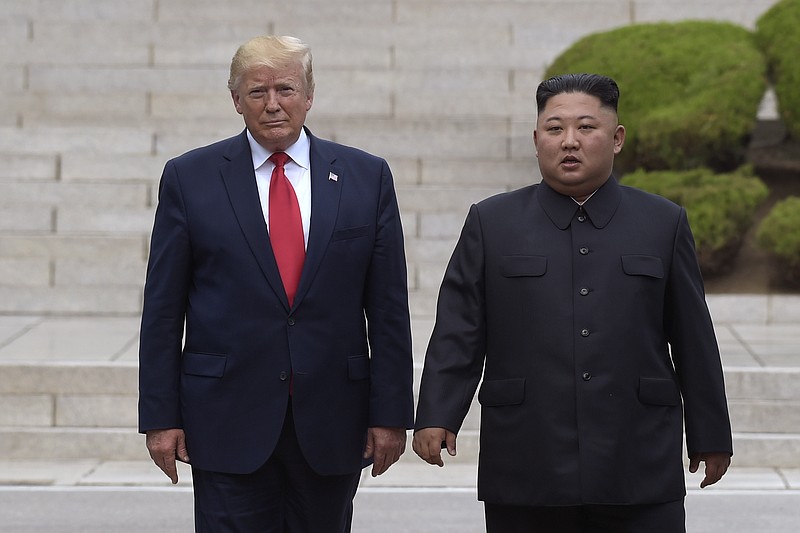When Democratic presidential candidate Barack Obama was asked in a 2007 debate if he would be "willing to meet separately, without precondition, during the first year of your administration, in Washington or anywhere else, with the leaders of Iran, Syria, Venezuela, Cuba and North Korea, in order to bridge the gap that divides our countries," he said he would.
Republicans were outraged.
On Sunday, current U.S. President Donald Trump met with North Korean leader Kim Jong Un for the third time as president and actually took steps into the totalitarian country.
Democrats are outraged.
One could correctly acknowledge there was hypocrisy in the outrage of both sides, but we would argue there is a difference.
In the run-up to the 2008 election, Obama was a one-term senator with no foreign policy experience whose utterances indicated he did not want the United States to be a world leader but an equal global partner with other nations. He preferred a weaker U.S. military and used apologetic language about past U.S. foreign incursions.
Although the White House later said of the new president, "Obama has consistently said he is willing to meet, without preconditions but with preparation, the leaders of Iran," he never did, nor did he meet with Kim. But his administration did wind up negotiating the flawed, one-sided nuclear agreement with Iran, an agreement that could not be made a treaty because it would have been defeated in the Senate.
Trump, when elected, had only foreign business experience, not experience in the political affairs of other nations. He also had made negative remarks about U.S. foreign incursions. But the president, with the backing of a rebuilt military necessary for a world leader and sanctions in place, was first overly aggressive and more recently excessively accommodating in his talk about North Korea. He'd also been on the job more than two years before making any entreaties to the country.
"It was a very positive day, a very positive event," the president said of his weekend meeting with Kim, in which the two countries agreed to restart talks about the Korean country's nuclear threat. "I think it's really good for the world."
About the talks, Trump added, "We're not looking for speed. We're looking to get it right."
Democrats, desperate the president might gain an advantage that would help him in the 2020 election, were quick to dismiss the meeting with Kim.
Trump shouldn't be "squandering American influence on photo ops and exchanging love letters with a ruthless dictator," U.S. Sen. Elizabeth Warren, D-Massachusetts, said.
The president, said U.S. Sen. Kamala Harris, D-California, should take North Korea's nuclear threat and "crimes against humanity seriously."
Trump is "coddling" dictators at the "expense of American national security," a spokesperson for former Vice President Joe Biden said.
Until terms are discussed and made public or an agreement is signed, though, talk is only that. If it leads to more discussion and some type of agreement in which North Korea gets rid of some or all of its nuclear arsenal, how bad could it be?
If a proposed agreement appears to assume too much of the Pacific Rim country or gives away too much for too little in return, there is plenty of time to criticize and debate the merits of a deal. If that becomes the case, Trump's own Republican Party would be the first to squawk.
We've said before we appreciate the boldness of the president's approach, like Nixon going to closed China or Reagan waging peace with the then-Soviet Union. Not many presidents can call a country's leader "Little Rocket Man" and later walk beside that leader and become the first sitting president to take steps into the country.
Will it work? Maybe or maybe not.
But to revisit candidate Obama, who did not live up to his own words: "[T]he notion that somehow not talking to countries is punishment to them - which has been the guiding diplomatic principle of this [George W. Bush] administration - is ridiculous."
Then, as president:
"I reserve the right, as president of the United States," Obama said, "to meet with anybody at a time and place of my choosing if I think it's going to keep America safe."
Like it or not, that's what Trump is trying to do.
